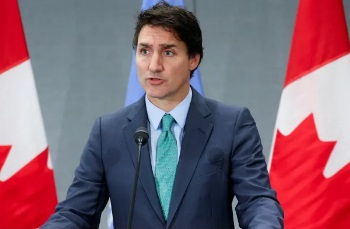Canada’s Prime Minister Justin Trudeau announced his resignation 6 January as leader of the Liberal Party, effectively ending nearly a decade in power. He will stay on as caretaker PM until a new leader of the party is chosen. The development was on the cards as Trudeau had been besieged with criticism from his own party leaders for his failure to deliver, while US President-elect Donald Trump’s threat of imposing a massive tariff on Canadian goods seemed to have proved to be the proverbial last straw.
A new party leader will be entrusted with the uphill task of shoring up support for Liberals ahead of a general election that must be held this year. Trudeau’s Liberals are trailing badly in the polls to the Opposition Conservatives and only narrowly survived three non-confidence votes in Parliament late last year. Trudeau’s fate became sealed after all three Opposition parties had said they would support a vote to topple his minority government. But Trudeau’s situation appeared more and more precarious with members of his own party increasingly clamouring for his resignation. No wonder that in his parting words he admitted “internal battles” meaning that he “cannot be the best option” in the next election. Known to be a fighter against odds, Trudeau, however, found the going extremely tough this time as his political moves backfired and he became mired in personal scandals, including ill-gotten money for his family through quid pro quo. The Parliament was to resume 27 January, but Trudeau announced it would remain suspended until 24 March. The intent of the move is to allow his Liberal Party to find a new leader and try to influence the electorate with a fresh face. There is no denying the fact that Trudeau had taken many laudable steps as a promising liberal leader. He was instrumental in setting up a $10-a-day child care, providing better dental care and a national climate plan.
However, Conservative leader Pierre Poilievre, who is ambitious to capture power, said nothing has really changed under Trudeau. Trudeau came to power in 2015 after 10 years of Conservative Party rule, and had initially been hailed for returning the country to its liberal past. He was once the rising star of global progressive politics, but ended up being a discredited leader with his approval ratings dropping to a new low of only 33 per cent late last year. He became deeply unpopular with voters in recent years over a raft of issues, including rise in cost of food, housing, and immigration. Trudeau’s political fortunes nosedived following the surprise resignation in December, 2024 of his former finance minister and deputy prime minister Chrystia Freeland. In a scathing resignation letter, Freeland accused Trudeau of focusing on “costly political gimmicks” to appease voters, including a costly Christmas tax holiday. She felt Trudeau needed to steady Canada’s finances ahead of a possible trade war with the US. Donald Trump, who will assume charge as US President later this month, has promised to impose a 25 per cent tariff on all Canadian imports, a measure that could prove devastating to Canada’s economy.
Trump and his new lieutenant Elon Musk are elated over the development. The President-elect has gone to the length of saying that Canada should merge with the US in which case its economic ills will be remedied and the defence system strengthened enough to withstand attacks from China or Russia. This is undoubtedly all rhetoric. But, it is true that Trudeau’s time is out as he became tactless on many issues, including his personal life in which he divorced his wife and started living with a male partner. It is to be seen how his successor takes up the challenges facing Canada. The Conservatives, with the likely support from Trump, may succeed.







































